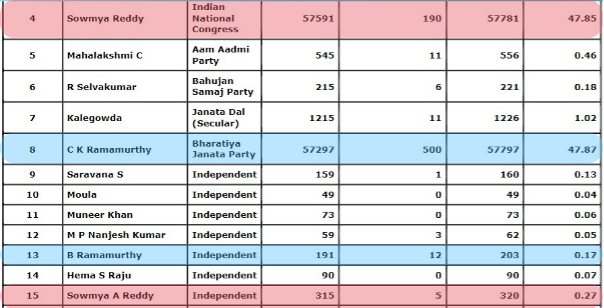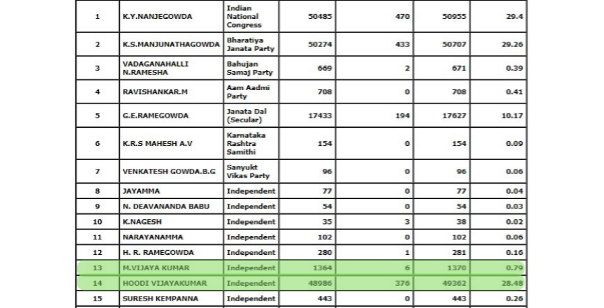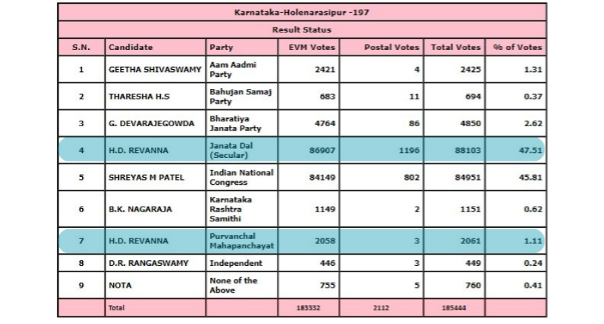In 2014 Lok Sabha (LS) elections, when popular actor Hema Malini was contesting from Mathura constituency, she was up against another Hema Malini. In 2019, when Rahul Gandhi was contesting from Wayanad constituency, he was against one other Rahul Gandhi, and another Raghul Gandhi. How do these ‘Dummy’ candidates affect election results? We look at examples from the 2023 Karnataka Assembly Elections.
In the 2014 Lok Sabha (LS) elections, when popular actor Hema Malini was contesting from the Mathura constituency, she was up against another Hema Malini.
In 2019, when Rahul Gandhi was contesting from the Wayanad constituency, he was against another Rahul Gandhi and one more Raghul Gandhi
In 2023, when H.D. Revanna, a legislator of Janata Dal (Secular) from Karnataka contested from Holenarasipur constituency, he was up against another H.D. Revanna from Purvanchal Mahapanchayat party.
What’s in the name? One might ask.
Winning an election is the ultimate goal of a political party. Terming this as an ‘election tradecraft’, political parties try every trick in the book to end up on the winning side. While the traditional electoral tradecraft focussed on leveraging the existing strength to win the elections, the trend from the past few years has been to weaken the opposition.
Over the past few years, a new approach emerged to confuse voters by fielding a candidate with a similar name as that of the opponent. In various instances throughout the history of Indian elections, political parties have put forth candidates with identical names in an effort to mislead voters. These generally “identical” candidates are not a coincidence; they are part of an age-old political trick to deceive voters who might inadvertently choose the wrong candidate once they enter the voting booth.
Political parties frequently look for namesakes and then support their election expenses in order to oppose them in constituencies where there is a close contest, and a slight margin of votes could swing the elections. While the impact of these ‘identical’ candidates varies, they cause significant damage to voting share in constituencies with a close contest.
In this story, we look at such instances from the recently concluded 2023 Karnataka Assembly elections, and their potential impact on the results.
Methodology followed to identify candidates with similar names
The matching algorithm used is “Sequence Matcher” which works by analysing the individual elements of the sequences and finding the longest common subsequence. This means it looks for the longest sequence of elements that appear in the same order in both sequences. By finding this common subsequence, we can determine how similar the two sequences are.
This algorithm returns a value between 0 and 1, where 0 means no similarity and 1 means an exact match. The higher the ratio, the more similar the sequences are.
We used the above concept, and implemented it at every constituency level to find the similarity of names for the candidates. Here are some examples that we found:
| Case 1 | Case 2 | Match Score |
| Sowmya Reddy | Sowmya A Reddy | 0.92 |
| SHARATH KUMAR BACHEGOWDA | SHARATH BACHEGOWDA | 0.86 |
1st Instance – (Higher match scores, possible swing of electoral result):
This is from the Jayanagar constituency. After what seemed like an endless high-voltage drama in the constituency, BJP candidate C.K. Ramamurthy defeated incumbent Congress MLA Sowmya Reddy by a narrow margin of 16 votes. Earlier, Sowmya Reddy was alleged to be declared as the winner with 160 vote majority, but after several recounts of postal ballots, C.K. Ramamurthy emerged as the winner. The final update on the website of the Election Commission of India (ECI) shows that Ramamurthy received 57,797 votes (including 500 postal votes) against Reddy’s 57,781 votes (including 190 postal votes). Below is the image of the final result as published by the ECI.

If we carefully observe, there are two independent candidates with similar names to that of those from the major parties. ‘Sowmya Reddy’ has ‘Sowmya A Reddy’ as a similar name candidate, while ‘C K Ramamurthy’ had ‘B Ramamurthy’. The match scores as per our methodology for the above candidates are 92% and 85% respectively.
Assuming that these dummy candidates did not fight the elections, and their share is completely added to the candidates from BJP and INC, the new total tally of votes for Sowmya Reddy would be 58101 votes (sum of 57781 & 320), whereas the same for C K Ramamurthy would be 58000 votes (sum of 57797 & 203). Clearly, Sowmya Reddy from INC could have emerged as a winner with a margin of 101 votes.
This is a case of similar-name candidates swinging the election result.
2nd instance – (Higher match scores, no swing in electoral result, but impact on victory margin)
This is the case of the Malur constituency. The Malur assembly seat falls within the Kolar Lok Sabha seat in the state of Karnataka. Despite a fierce fight from BJP candidate KS Manjunatha Gowda, Congress leader KY Nanjegowda was able to retain his seat in Malur by a margin of 248 votes. In the 2018 elections, the incumbent MLA KY Nanjegowda defeated KS Manjunatha Gowda (contested by JD(S) party) by a margin of 17,915 votes.
In the 2023 elections, Hoodi Vijay Kumar was hoping for a ticket from the BJP. After being denied the ticket, he contested as a rebel candidate.
Below is the final result of the Malur constituency in 2023.

Here the margin of victory is 248 votes. Hoodi Vijayakumar stood third with a total of 49362 votes. Another candidate with a similar name M. Vijayakumar got 1370 votes. As per our methodology, the match score is 77%. Assuming that M. Vijayakumar did not contest elections, and all his votes are transferred to Hoodi Vijayakumar, the new total votes polled for Hoodi Vijayakumar comes to 50,732 votes. This is slightly higher than the votes polled for KS Manjunatha Gowda, hence making Hoodi Vijayakumar the new runner-up. The winner remains the same, KY Nanjegowda, but with a reduced margin of 223 votes.
In this case, while the result is not affected, the victory margin is affected.
3rd instance (Highest match score, but no impact on election result and victory margin):
This is the case of the Holenarsipur constituency. Holenarasipur is an assembly constituency in the Hassan district of Karnataka. The primary candidates of the constituency are DevarajeGowda from the BJP, Shreyas M. Patel from the INC, and H.D Revanna from the JD(S). In the end, H.D. Revanna won the election with a margin of 3152 votes against Shreyas M Patil of INC.

Upon observation, there is a similar candidate with the name H.D. Revanna, who contested from the Purvanchal Mahapanchayat party, with a match score of 100%. This candidate got 2061 votes. Assuming H.D. Revanna from the Purvanchal Mahapanchayat party did not fight elections, and the votes are completely transferred to H.D. Revanna from JDS, then, the majority would have increased to 5213 votes (2061 votes added to the earlier margin of 3152 votes).
Having said this, there is also a higher probability of H.D. Revanna from JD(S) losing, if more votes were split since both candidates have exact names.
Using ‘Doppelgangers’ to split the votes – akin to ‘political and electoral fraud’.
Confusing voters by fielding candidates with identical names is often used as a tactic to weaken the support for a popular candidate. While such acts are not illegal, they make a mockery of the entire electoral process. These acts are dirty tricks to deceive and confuse voters. These acts affect the fundamental principle of the electoral process- “level playing field.”
To minimize the impact of such acts, the Election Commission has been taking various steps, including printing candidate photos with candidate names, measures to be taken in case of dummy candidates, and similar such steps. However, the instances of identical names in elections have only grown over time. Unless such instances are kept under check, the idea of free and fair elections could become a thing of the past.
Featured Image: ‘Dummy’ candidates effect on election results


